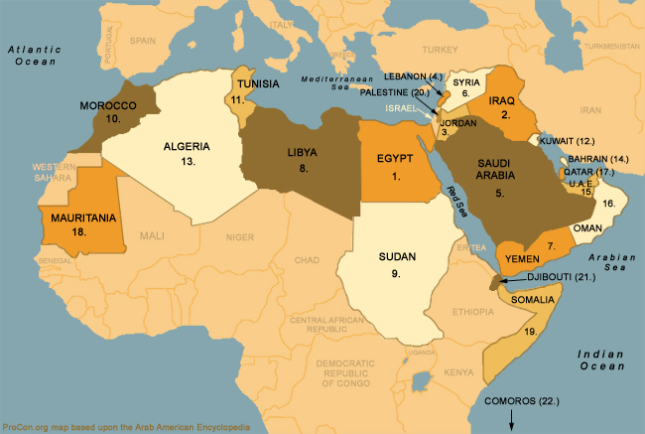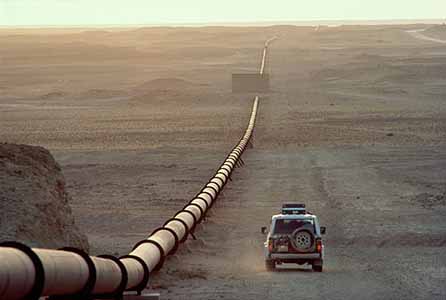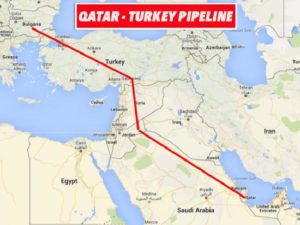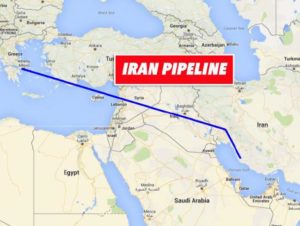Dr. Salem Y. Lakhal & Salama Kila
Since the beginning of the Syrian revolution, there has been a “convincing” narrative surrounding the events in an attempt to explain what is going on. This narrative rejects the idea of a revolution, and, defends the conspiracy theory. This was based on the idea of a “gas pipeline”, defending that Qatar asked to implement a gas pipeline to the Mediterranean Sea, and that Bashar al-Assad refused to do so and so, as a result of its good relationship with Russia, it will be a rival to the Russian pipeline supplying Europe.
There is no doubt that the issue of oil and gas pipelines had been taken space of the debate, and underwent maneuvers between the countries, as a result of the interests of each of them. It would have been the reasons for the occupation of Afghanistan in order to extend the oil pipeline from the Caspian Sea to the Indian Ocean via Afghanistan and Pakistan. It also held discussions and disagreements on extending the pipeline from Central Asia to Europe generating conflicts between Russia and Turkey on where it will discharge, after Turkey suggested the port of Ceyhan, and Russia preferred their lands.
It is not in the interest of Russia to extend a gas pipeline, especially from the Persian Gulf to the Mediterranean Sea, because it will compete on the European market, which is essential for Russia. Russia currently supplies Europe with a quarter of the gas it uses for heating, cooking, fuel and other activities. Furthermore, 80 percent of the gas that Russian state-controlled company Gazprom produces is sold to Europe, so, maintaining this crucial market is very important (Chang 2015). For this reason, Russia was afraid of all attempts to extend the oil and gas pipelines to the Mediterranean. From there, access to Europe is easy. Despite this, there has not been a big debate about this, since the matter is highly sensitive to Russia, with two-thirds of their income depending on oil and gas.
What can be explained here is that the Syrian regime did not interested in Russian sensitivity, and did not think it at all, because the relationship with Russia was not sophisticated or even extraordinary, but rather, it was very cold. Bashar al-Assad visited Moscow in 2008, and spoke about oil and gas and the four seas, having confidence in his relationship with Qatar and Turkey and the traditional close relationship with Iran. When the US instituted blockade on Syria, a strategic agreement with Iran and a strategic pact with Turkey had been signed. Turkish-Syrian and Qatar axis has emerged as a united coalition, and Bashar al-Assad gave economic concessions to them.
Within this evolving tripartite relationship, the idea of laying a gas pipeline to the port of Tartus emerged. The study was going on between Qatar and Iran as a source of gas and the Syrian regime the country of export to Europe, through Iraq (Figure 1). The issue was to export from an Iranian joint Qatari gas field in the Gulf. Qatar’s plans were first put forward in 2009 and involved building a pipeline from the Persian Gulf via Saudi Arabia, Jordan, Syria and Turkey. The signing took place on this pipeline, in spite of strong US objections, because the US was imposing the blockade on Iran. Then, the pressure was on Qatar, in order to refrain from participating in the pipeline.
Figure 1: Pipeline from Iran via Iraq and Syria to Europe. Source: Supplied
This shows that the Syrian regime did not reject the “gas pipeline”, but signed it, despite the pressure made by US to prevent it. Bashar al-Assad finally confirmed Iran’s involvement when he said “there were two lines crossing Syria, one from the north to south it is the Qatari pipeline (Figure 1) and, the second from east to west to the Mediterranean crossing Iraq from Iran (Figure 2), we intend to extend this pipeline from east to the West.”
They have been hiding these facts after the revolution, in order to create a conspiracy theory in favor to Bashar al-Assad’s regime. There is no doubt that Bashar al-Assad interview with the Italian newspaper Il Giornale (30/12/2016, text reported by the Syrian news agency “SANA”) describes this fabrication. He was clearly embarrassed when asked about the “Qatari gas pipeline.” He answered in a funny way: “I think that there are countries that were opposed to Syria’s policy, they do not want that Syria become a center of energy, whether electrical or oil, or even to become an intersection of railway points, and so on. This is one of the factors, but the pipeline from north to south, and its relationship with Qatar did not presented to us directly. ”
Although it “was a significant factor, but he did not presented to us openly, but I think it was planned,” he says. He believes that it was “planned,” and he said “no” to what was believed to have been planned. This answer is trying to reconcile the conspiracy theory and the fact, that it has not been raised to build a pipeline from the “north-south project” (not from south to north). Therefore, he did not say “no” to what did not asked for. What is asked is the pipeline from the Gulf through Iraq to Tartus, Iranian and Qatari-sharing, and I said “yes,” for this and the agreement was signed.
In the atmosphere of great cordiality that existed with Qatar, it was natural that the Syrian Regime said “yes” and presented to Qatar several economic projects, and allowed the Turkish economy to contribute to the destruction of some Syrian economic sectors. The Words of Bashar al-Assad are evident in his approval, and confirmed his lack of knowledge about “north / south pipeline” (or Qatar has not suggested it) (Figure 2). It seems that he tried to emphasize that the gas pipeline was the cause of “conspiracy”, but he originally denied the existence of pipeline project on the table. For this, look, the “no” said in the interview is part of the written scenario discourse justifying the “conspiracy” after the outbreak of the revolution.
Figure 2: The proposed North-South gas pipeline from Qatar via Saudi Arabia, Jordan, Syria and Turkey to Europe. Source: Supplied
There is no doubt that the US was refusing the project, precisely because it is a joint Iranian-Qatari project, and this is what Bashar al-Assad acknowledged that he had agreed to. Furthermore, Russia was afraid of the success of the project, because they did not want to have a competitor in the European market in which it has as a special monopoly situation. If Russia refuses the north / south pipeline, because it is supplying gas to Europe, it is more convenient that the east / west pipeline will be rejected too because it competes with the Russian pipeline. Had Assad rejected the first pipeline, taking into account the “Russian comrades,” it is more judicious to reject the second pipeline for the same reason. What we mean by that is, the Syrian Regime was not taking into account the Russian position, because their relationship was at the “minimal level”, and visited Russia only once, while visited Europe many times (and this is what Putin said in one of his statements, to indicate that the relationship with the Syrian regime were not good before the revolution). At that time, the Syrian regime alliance was with Turkey / Qatar, Iran, and the relationship with the United States has returned to normal, “or better” as the Syrian ambassador in Washington said in 2010.
For this, while Bashar al-Assad, points out, in his interview with the Italian newspaper, he believes “there are many countries that were opposed to Syria’s policy not want that Syria become a center of energy, whether electrical or oil, or even to become an intersection point of the railway, and so on, “there is no doubt that among those was Russia (and not Qatar at that time which was a friend), because they want to have the monopoly of supplying Europe with oil and gas, and do not want competition from other parties. And all the projects putted forward in order exporting oil and gas from Central Asia, the Gulf, hit the Russian position. Russia’s dependence on oil and gas pushes it to monopolize markets. Although it has sought out other markets such as China, Russia remains dependent on the European market. This was clear, when the pipeline passing through Ukraine was closed following the European sanctions, and it is now looking for a Turkish port.
It is then, clear, that Russia is among the countries that they do not want Syria to become an energy hub, and this is one of the fundamental reasons behand the military intervention in Syria After Russia became the oil and gas Syrian controller, as well as ways of Transportation to the Mediterranean, the project signed by Assad for the pipelines from east to west will not be implemented. Do we consider what happened in Syria, “a Russian plot”? Certainly not, but Russia has taken advantage of the situation, to intervene and impose its presence and control the political decision in Damascus.
If the Syrian regime and his supporters have written the scenario of the “war on gas”, they have put one of the bases that can be light on understanding the Russian military intervention, and brutality practiced against the Syrian people, and then to agree on long-term occupation. Russia works hard to prevent all attempts to extend pipelines oil and gas to Europe, and they are engaged on a violent struggle for the oil and gas market control. Moreover, there is no doubt that the intervention in Syria aims to prevent not only the Qatari “pipeline”, but also the Iranian on.



